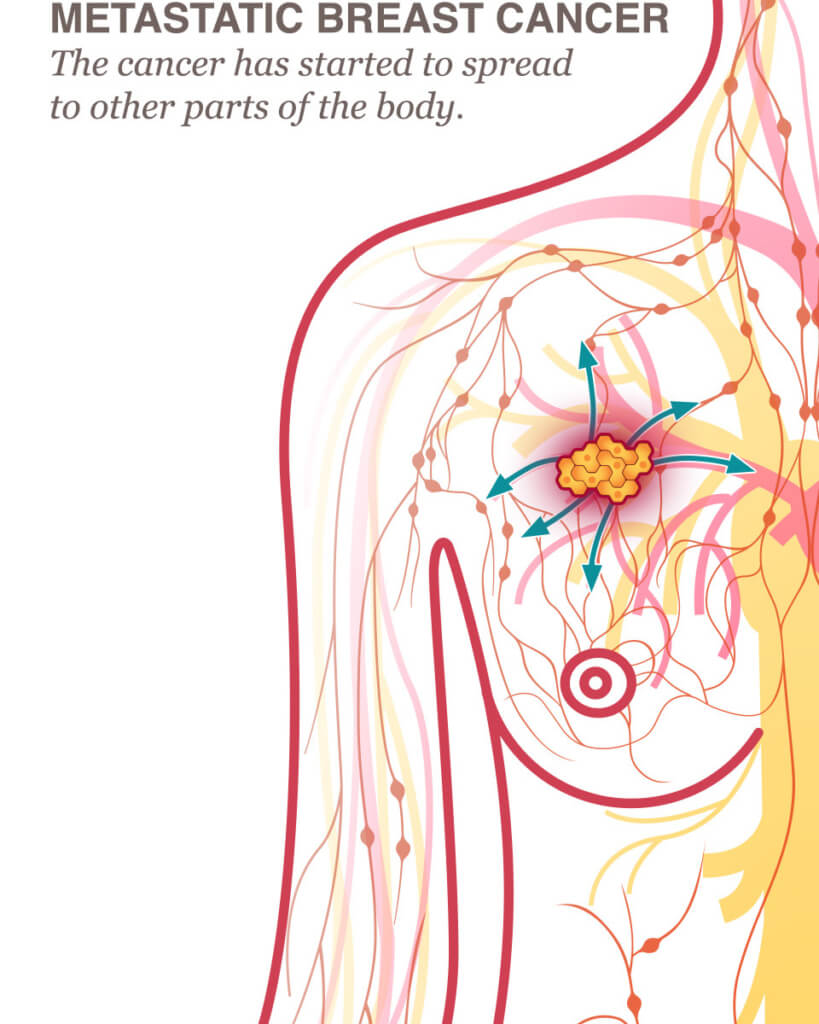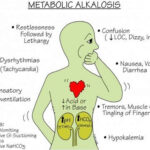Metastatic breast carcinoma is an advanced form of breast cancer in which malignant cells spread beyond the breast to distant organs such as the lungs, liver, bones, and brain. This condition is also known as stage IV breast cancer and is a leading cause of cancer-related mortality among women. Understanding its causes, symptoms, and available treatments is crucial for early detection and improved survival rates.

Causes and Risk Factors
Metastatic breast carcinoma occurs when cancer cells break away from the primary tumor and travel through the bloodstream or lymphatic system. Several factors contribute to the likelihood of metastasis:
1. Genetic Mutations
- BRCA1 and BRCA2 mutations increase the risk of breast cancer metastasis.
- TP53 and HER2 gene alterations can promote aggressive cancer growth.
2. Tumor Characteristics
- Triple-negative breast cancer (TNBC) has a higher likelihood of metastasis.
- HER2-positive tumors may spread more rapidly if untreated.
3. Lifestyle and Environmental Factors
- Obesity and high alcohol consumption increase the risk.
- Chronic stress and exposure to carcinogens can contribute to cancer progression.
4. Incomplete Treatment
- Delayed or inadequate treatment can allow cancer cells to survive and spread.
- Resistance to chemotherapy or hormonal therapy may lead to recurrence and metastasis.
Symptoms of Metastatic Breast Carcinoma
Symptoms vary depending on the affected organ. Some common signs include:
1. Bone Metastases
- Persistent bone pain
- Increased risk of fractures
2. Lung Metastases
- Chronic cough
- Shortness of breath
- Chest pain
3. Liver Metastases
- Jaundice (yellowing of the skin and eyes)
- Abdominal swelling and pain
- Nausea and loss of appetite
4. Brain Metastases
- Persistent headaches
- Seizures
- Vision and speech difficulties
Diagnosis and Staging
Several diagnostic techniques help confirm and stage metastatic breast carcinoma:
1. Imaging Tests
- CT Scans & MRI: Detect metastatic tumors in organs and bones.
- PET Scans: Identify cancer spread at a molecular level.
- Bone Scans: Locate bone metastases.
2. Biopsy and Pathology
- A biopsy of suspected metastatic lesions confirms cancer presence.
- Immunohistochemistry (IHC) testing determines receptor status (HER2, ER, PR).
3. Blood Tests
- Tumor Markers: Elevated CA 15-3 and CEA levels may indicate metastasis.
- Liver Function Tests: Detect liver involvement.
Treatment Options
Treatment for metastatic breast carcinoma aims to control disease progression and improve quality of life. Available therapies depend on cancer type, location, and patient health.
1. Hormone Therapy
- Used for estrogen receptor-positive (ER+) cancers.
- Medications: Tamoxifen, Aromatase inhibitors, Fulvestrant.
2. Targeted Therapy
- HER2-positive cancer: Trastuzumab (Herceptin), Pertuzumab.
- CDK4/6 inhibitors: Palbociclib (Ibrance) for ER+ cases.
3. Chemotherapy
- Used for triple-negative breast cancer (TNBC) and chemotherapy-resistant tumors.
- Drugs: Doxorubicin, Paclitaxel, Capecitabine.
4. Immunotherapy
- Pembrolizumab (Keytruda) is effective for PD-L1-positive TNBC.
5. Radiation Therapy
- Helps reduce pain and control metastases in bones and brain.
6. Surgery
- Generally not a primary option but may help in palliative care.
Prognosis and Survival Rate
Survival rates vary based on cancer type, location, and response to treatment. The five-year relative survival rate for metastatic breast carcinoma is approximately 28%, but advancements in targeted therapies are improving outcomes.
Factors Affecting Prognosis
- Tumor receptor status (ER+, HER2+ have better treatment responses).
- Patient’s overall health and response to treatment.
- Early detection of metastasis improves life expectancy.
Preventive Measures and Lifestyle Changes
While metastatic breast cancer cannot always be prevented, lifestyle modifications may reduce recurrence risks:
- Regular Screening: Mammograms and genetic testing for high-risk individuals.
- Healthy Diet: Mediterranean diet rich in antioxidants and fiber.
- Exercise: At least 150 minutes of moderate physical activity per week.
- Avoid Alcohol & Smoking: Reduces cancer progression risks.
- Adherence to Treatment: Following prescribed therapies minimizes recurrence chances.
Metastatic breast carcinoma is a life-threatening condition requiring comprehensive medical intervention. Early diagnosis, personalized treatment plans, and supportive care can enhance survival rates and improve the quality of life for patients. Ongoing research in immunotherapy and targeted treatments continues to offer hope for better outcomes in managing this advanced stage of breast cancer.

